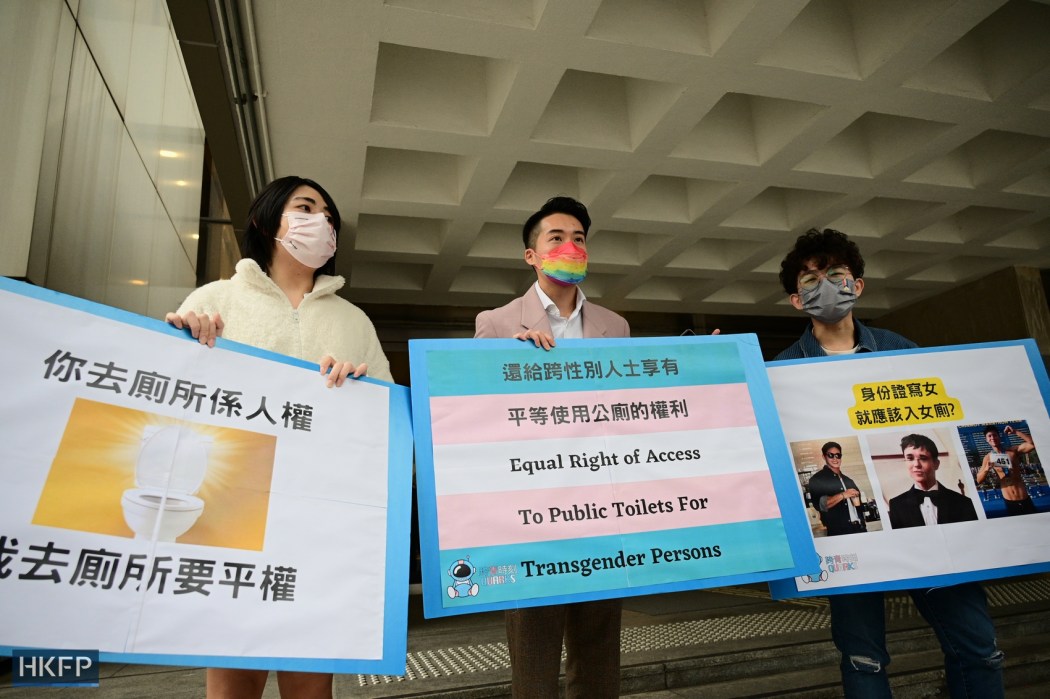Hong Kong should allow transgender people to use public toilets designated for their chosen gender before they have undergone surgery, the High Court was told during a constitutional challenge to the city’s public convenience regulations.

The legal bid filed by K, who identifies as a male but was born as a woman, was heard by Judge Russell Coleman on Thursday.
The applicant seeks to amend the wording in the Public Conveniences (Conduct and Behaviour) Regulations to allow a transgender person undergoing Real Life Experience (RLE) treatment under the certification and care of a doctor to use public toilets of their identified gender.
Representing K in court, barrister Tim Parker said the RLE treatment was an essential step to gender transitioning for K and other transgender people in his position, after they are diagnosed with gender dysphoria.
The treatment requires them to live in their identified gender consistently on a day-to-day basis, which includes the use of public conveniences of that gender, Parker said.
The legislation in question currently criminalises people over the age of five who enter public conveniences allocated for the opposite sex. As K has not yet undergone a full sex replacement surgery, the applicant is legally banned from using male public toilets.

The lawyer challenged the legislation as “inconsistent”, and leading to disproportionate harm to his client and other transgender people in a similar position.
Parker said that if allowing transgender people to use toilets of their affirmed sex could cause serious harm to the public, the regulation should cover all toilets in public spaces, and not just those regulated by the Environment and Ecology Bureau.
In addition, the barrister said his client would have been able to enter a male public toilet in the city had he been a British national – as transgender people in K’s position could have changed the sex marker on his identification documents under the country’s law.
Hong Kong’s current policy only allows transgender people to change the sex indicated on their identity cards if they have undergone full sex reassignment surgery. The measure is currently under a separate legal challenge in the city’s top court.
“So K’s access [to male public toilets] depends on the document carried on him, not on his physical or inherent characteristics,” Parker said.

Barrister Bonnie Cheng, for the government, said the law in question was “rationally connected” to its aim.
Cheng said people would “naturally feel uncomfortable or embarrassed” when they share the same bathroom with a person of the opposite biological sex, and that “has nothing to do with whether that person is transgender or not.”
She added that the aim of the law was to minimise the chance of users falling victim to sexual offences, and to meet the social expectations of sex segregation in bathroom settings.
“We are not suggesting that transgender people have a higher tendency on committing these offences,” Cheng added.
Balance of harm
Parker said there was “powerful evidence” that blocking transgender people in his client’s position from using public toilets of their affirmed gender caused them “actual and direct harm.”
Citing multiple empirical research from overseas, Parker said such regulations would worsen the already vulnerable mental state of transgender people.
The lawyer said a study by the Chinese University of Hong Kong had shown that transgender people would face a higher risk of verbal assault, physical violence or unwanted sexual contact when using a toilet matching their original sex.

He said the government’s representatives had not produced any proof supporting their concerns over the safety and privacy of other toilet users.
Parker also urged the court to consider the “practical” situation when a transgender person during RLE treatment would use a toilet of their affirmed sex – privately inside a closed cubicle.
In response, Cheng said there was no regulation currently in place that mandates any toilet users use cubicles with the door closed. She added that there are bathhouses in Hong Kong without individual stalls.
Drawing the line
Parker said transgender people like his client should be able to access toilets of their affirmed gender after they obtain a Gender Identity Disorder letter from a medical practitioner.
Citing the words of K’s psychiatrist Gordon Wong, Parker said transgender people could only receive such a certificate after a doctor had diagnosed gender dysphoria and found that they were committed and prepared to live the rest of their lives in their identified gender.
Parker said there was an internationally-recognised criterion for such a diagnosis and it was not based on the patient’s self-declaration or a doctor’s individual opinion.
However, Cheng said the court should respect a previous Court of Appeal ruling and not accept any standard lower than full surgery. The hearing is expected to end on Friday, with a judgement around the end of February.
Support HKFP | Policies & Ethics | Error/typo? | Contact Us | Newsletter | Transparency & Annual Report | Apps
Help safeguard press freedom & keep HKFP free for all readers by supporting our team

LATEST FROM HKFP
HKFP has an impartial stance, transparent funding, and balanced coverage guided by an Ethics Code and Corrections Policy.
Support press freedom & help us surpass 1,000 monthly Patrons: 100% independent, governed by an ethics code & not-for-profit.










